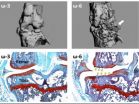(Press-News.org) SEATTLE, WA – Re-tearing a repaired knee Anterior Cruciate Ligament (ACL) happens all too frequently, however a recent study being presented today at the American Orthopaedic Society for Sports Medicine's (AOSSM) Annual Meeting suggests that identification and patient education regarding modifiable risk factors may minimize the chance of a future ACL tear.
"Our research suggests that a few risk factors such as, age, activity level and type of graft utilized may point to the possibility of re-injury," said lead author, Christopher C. Kaeding, MD of the Ohio State University. "However, with better education about adjustments that can be made, based on these risk factors, patients may be able to minimize re-tears."
Kaeding and his team analyzed data from 2,695 patients through the MOON ACL injury database from 2002-2008. All patients had a primary ACL reconstruction with no history of contralateral knee surgery. Graft type, age, Mark score, sport played after surgery, sex, smoking status, meniscal tear status and Body Mass Index (BMI) were identified as criteria for inclusion into the study.
In the results, 116/2695 (4.3%) had a graft re-tear on the same side of the body and 97/2695 (3.6%) had a re-tear on the opposite side. The odds of re-tearing the same ACL, decreased by nine percent for each year of increased age. The odds of re-tear on the opposite ACL, decreased by four percent for every year of increased age.
"The study highlights that younger age, higher activity levels at time of injury and what type of graft used (allograft) may increase risk of same side ACL injury within two years. With individuals having higher activity levels and lower age re-tears on the opposite leg were more prominent," said Kaeding. "Physicians and physical therapists need to better educate our patients about continued neuro-muscular training even after the immediate rehabilitation process has ended to help prevent future tears."
INFORMATION:
The American Orthopaedic Society for Sports Medicine (AOSSM) is a world leader in sports medicine education, research, communication and fellowship, and includes national and international orthopaedic sports medicine leaders. The Society works closely with many other sports medicine specialists, including athletic trainers, physical therapists, family physicians, and others to improve the identification, prevention, treatment, and rehabilitation of sports injuries. AOSSM is also a founding partner of the STOP Sports Injuries campaign to prevent overuse and traumatic injuries in kids. For more information on AOSSM or the STOP Sports Injuries campaign, visit http://www.sportsmed.org or http://www.stopsportsinjuries.org
New study may identify risk factors for ACL re-injury
2014-07-11
ELSE PRESS RELEASES FROM THIS DATE:
Potent spider toxin 'electrocutes' German, not American, cockroaches
2014-07-11
Using spider toxins to study the proteins that let nerve cells send out electrical signals, Johns Hopkins researchers say they have stumbled upon a biological tactic that may offer a new way to protect crops from insect plagues in a safe and environmentally responsible way.
Their finding—that naturally occurring insect toxins can be lethal for one species and harmless for a closely related one—suggests that insecticides can be designed to target specific pests without harming beneficial species like bees. A summary of the research, led by Frank Bosmans, Ph.D., an assistant ...
Blame it on the astrocytes
2014-07-11
Rio de Janeiro, Brazil- In the brains of all vertebrates, information is transmitted through synapses, a mechanism that allows an electric or chemical signal to be passed from one brain cell to another. Chemical synapses, which are the most abundant type of synapse, can be either excitatory or inhibitory. Synapse formation is crucial for learning, memory, perception and cognition, and the balance between excitatory and inhibitory synapses critical for brain function. For instance, every time we learn something, the new information is transformed into memory through synaptic ...
Omega 3 fatty acids lessen severity of osteoarthritis in mice
2014-07-11
Mice consuming a supplement of omega 3 fatty acids had healthier joints than those fed diets high in saturated fats and omega 6 fatty acids, according to Duke Medicine researchers.
The findings, published in the Annals of the Rheumatic Diseases (10.1136/annrheumdis-2014-205601) on July 11, 2014, suggest that unhealthy dietary fats – not just obesity – may contribute to worsening osteoarthritis.
"Our results suggest that dietary factors play a more significant role than mechanical factors in the link between obesity and osteoarthritis," said Farshid Guilak, Ph.D., Laszlo ...
'Tailored' water -- the latest in lawn care
2014-07-11
In Santa Fe, Albuquerque, and other major cities in New Mexico, nearly every public golf course is now watered with treated municipal wastewater rather than precious potable water supplies. Across the U.S. Southwest as a whole, more than 40% of all golf courses receive treated effluent. Reusing the effluent increases the sustainability of golf courses.
Additionally, golf courses and homeowners alike fertilize their lawns during the growing season. The major nutrient in fertilizer is nitrate. A New Mexico State University turfgrass expert has a new vision for even more ...
Non-invasive test could be used to predict premature birth and delivery of small babies
2014-07-11
Testing for the presence of specific molecules present in the urine of pregnant women can give an indication in early pregnancy of whether a baby will be born premature or the fetus will suffer poor growth, according to research published in the open access journal BMC Medicine. Identifying these conditions early in pregnancy could potentially help reduce complications and manage any difficulties, although more work is needed before the findings can be translated to clinical settings.
Researchers from Imperial College London and the University of Crete analyzed the metabolites ...
Women under-represented in academic medicine
2014-07-11
Women are under-represented in academic medicine resulting in a waste of public investment due to loss of research talent. Writing in the July issue of the Journal of the Royal Society of Medicine, authors of an essay on women and academic medicine say that as a consequence of female under-representation, some areas of medicine are under-researched at a cost to patients and society. Discriminatory practices and unconscious bias, they say, continue to occur in academic medicine, despite a substantial fall in traditional discrepancies between men and women in medicine in ...
Heart health benefits of light drinking brought into question
2014-07-11
A reduction in alcohol consumption, even for light-to-moderate drinkers, could be linked to improved cardiovascular health, including a reduced risk of coronary heart disease, lower body mass index and blood pressure, according to new research published in The BMJ.
These latest findings challenge the results of previous observational studies which found that the consumption of light-to-moderate amounts of alcohol (12-25 units per week) may have a protective effect on cardiovascular health.
The research, led by the London School of Hygiene & Tropical Medicine with University ...
Injected vaccine could help eradicate polio
2014-07-11
Re-introducing a type of polio vaccine that fell out of favour in the 1960s could hasten eradication of the disease, according to new research.
The study, by Imperial College London and the Christian Medical College in Vellore, India, suggests that the injected polio vaccine (IPV), which is rarely used today in countries affected by polio, could provide better and longer lasting protection against infection if used in combination with the more commonly used live oral polio vaccine (OPV).
The findings are published today in The Lancet.
Vaccination protects an individual ...
The Lancet: World's most advanced dengue vaccine candidate shows promise in phase 3 trial
2014-07-11
The first dengue vaccine candidate (CYD-TDV) to reach phase 3 clinical testing has shown moderate protection (56%) against the disease in Asian children, according to new research published in The Lancet.
Dengue is a mosquito-borne disease that infects around 390 million people each year, of whom about 96 million suffer from symptomatic infection. WHO estimates that the global burden of dengue has risen 30-fold over the past 50 years, with over half of the world's population at risk of the disease.
There is no licensed vaccine available to treat or prevent dengue ...
The Lancet: Extra dose of inactivated polio vaccine boosts immunity in children and could speed up global eradication efforts
2014-07-11
Giving children under 5 years old an extra dose of inactivated polio vaccine (IPV) helps to boost their immunity to the poliovirus and should be added to vaccination programmes in polio-endemic countries and those facing a high risk of imported cases, suggests new research published in The Lancet.
Lead author Dr Jacob John from Christian Medical College, India explains, "Adding a supplementary IPV dose to children already vaccinated with oral poliovirus vaccine (OPV) may hasten polio eradication by boosting herd immunity in endemic regions, act as a booster to prevent ...


